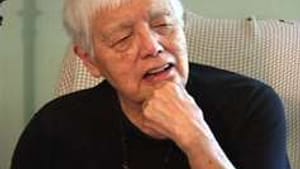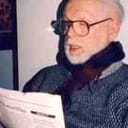Stay in the Loop
BSR publishes on a weekly schedule, with an email newsletter every Wednesday and Thursday morning. There’s no paywall, and subscribing is always free.
The philosopher's solution: A ray of hope for beleaguered Detroit
Is Detroit beyond redemption?

Gulp, my hometown of Detroit has filed for bankruptcy protection, the largest city in the world to do so. Of course I haven't lived there since 1951, when I moved, newly married, to East Lansing to finish my doctoral courses with the cheaper in-state tuition of Michigan State.
But I worried about Detroit's future as early as 1949, when I won the Jesuit Midwest Province annual essay contest. In "Needed: More Red-blooded Americans," I argue then that Detroit Catholics (like me) should confront the racism that crippled Detroit after World War II, when thousands of blacks moved from the South for defense jobs. Local Communists, I observed, were more Christian in their support of those blacks than most Catholics.
(My girlfriend and I upset most of my fellow students when we double-dated with a black couple to the senior prom at Eastwood Gardens, a leading dance spot.)
Coughlin's demagoguery
It wasn't my first such move: for my term paper in Father John Culkins's sociology course, I had explored the sociological contradictions of the new black equivalent of Life Magazine: Ebony, which supported A. Philip Randolph's railroad porters' union while simultaneously touting "white" hair straighteners in its ads.
Culkins liked my paper so much that he tried to convert me to a sociology major. Later I learned that he had been the leading American critic of the demagogic radio priest Father Charles Coughlin, who did his orating just up Woodward Avenue in suburban Royal Oak. Coughlin had disgraced Culkins's Church by mocking Franklin D. Roosevelt's leadership as a "Jew Deal."
Coughlin was of course accelerating racism in Detroit with his anti-Semitic conservatism. The more I mulled my unsuccessful early anti-racism, the more despondent I became.
Gold in the back yards
Nowadays, when I live in Weimar, Germany, I spent my Sunday mornings in a different kind of church: Internet Radio, which keeps me in contact with my favorite Philadelphia NPR station, WHYY. This past Sunday's edition of "On Being" introduced me to Detroit's 96-year-old Chinese-American philosopher Grace Lee Boggs and her description of "Feed 'Em Freedom," her urban farming scheme.
Are Detroiters despondent because of all those abandoned yards? Would you believe, Boggs informed her audience, that some 1,600 vegetable gardens happily bloom there now? (For more details, click here.)
Boggs studied philosophy at the University of Chicago at the peak of the Robert M. Hutchins regime (1929-51). She talked with the verve of a 20-year-old about her first hero, A. Philip Randolph, founder of the railroad porters union. He had the chutzpah to hit up FDR (and Eleanor Roosevelt too) for an executive order forbidding segregation in the defense industry. They grumbled, but he persisted, and in March 1941 FDR signed Executive Order 8802—setting a good example for Truman, who abolished racial segregation in the U.S. military in 1948.
Hegel's theory
Our 96-year-old heroine explained how Hegel taught her to turn problems into solutions. Detroit's current malaise gives those who haven't abandoned the city an opportunity to abandon old values for new solutions.
There is something encouraging about the way idealists like Dr. Boggs can turn a dead end into a flood of gardens raising eating standards for the poor of Detroit. Is it unreasonable to hope that some younger minds might do the same, in Detroit as well as elsewhere?
But I worried about Detroit's future as early as 1949, when I won the Jesuit Midwest Province annual essay contest. In "Needed: More Red-blooded Americans," I argue then that Detroit Catholics (like me) should confront the racism that crippled Detroit after World War II, when thousands of blacks moved from the South for defense jobs. Local Communists, I observed, were more Christian in their support of those blacks than most Catholics.
(My girlfriend and I upset most of my fellow students when we double-dated with a black couple to the senior prom at Eastwood Gardens, a leading dance spot.)
Coughlin's demagoguery
It wasn't my first such move: for my term paper in Father John Culkins's sociology course, I had explored the sociological contradictions of the new black equivalent of Life Magazine: Ebony, which supported A. Philip Randolph's railroad porters' union while simultaneously touting "white" hair straighteners in its ads.
Culkins liked my paper so much that he tried to convert me to a sociology major. Later I learned that he had been the leading American critic of the demagogic radio priest Father Charles Coughlin, who did his orating just up Woodward Avenue in suburban Royal Oak. Coughlin had disgraced Culkins's Church by mocking Franklin D. Roosevelt's leadership as a "Jew Deal."
Coughlin was of course accelerating racism in Detroit with his anti-Semitic conservatism. The more I mulled my unsuccessful early anti-racism, the more despondent I became.
Gold in the back yards
Nowadays, when I live in Weimar, Germany, I spent my Sunday mornings in a different kind of church: Internet Radio, which keeps me in contact with my favorite Philadelphia NPR station, WHYY. This past Sunday's edition of "On Being" introduced me to Detroit's 96-year-old Chinese-American philosopher Grace Lee Boggs and her description of "Feed 'Em Freedom," her urban farming scheme.
Are Detroiters despondent because of all those abandoned yards? Would you believe, Boggs informed her audience, that some 1,600 vegetable gardens happily bloom there now? (For more details, click here.)
Boggs studied philosophy at the University of Chicago at the peak of the Robert M. Hutchins regime (1929-51). She talked with the verve of a 20-year-old about her first hero, A. Philip Randolph, founder of the railroad porters union. He had the chutzpah to hit up FDR (and Eleanor Roosevelt too) for an executive order forbidding segregation in the defense industry. They grumbled, but he persisted, and in March 1941 FDR signed Executive Order 8802—setting a good example for Truman, who abolished racial segregation in the U.S. military in 1948.
Hegel's theory
Our 96-year-old heroine explained how Hegel taught her to turn problems into solutions. Detroit's current malaise gives those who haven't abandoned the city an opportunity to abandon old values for new solutions.
There is something encouraging about the way idealists like Dr. Boggs can turn a dead end into a flood of gardens raising eating standards for the poor of Detroit. Is it unreasonable to hope that some younger minds might do the same, in Detroit as well as elsewhere?
Sign up for our newsletter
All of the week's new articles, all in one place. Sign up for the free weekly BSR newsletters, and don't miss a conversation.

 Patrick D. Hazard
Patrick D. Hazard